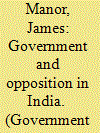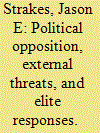|
|
|
Sort Order |
|
|
|
Items / Page
|
|
|
|
|
|
|
| Srl | Item |
| 1 |
ID:
193474


|
|
|
|
|
| Summary/Abstract |
Elections under authoritarian regimes rarely deliver democratic outcomes. Still, most observers and pollsters expected Turkey’s May 2023 presidential and parliamentary elections to be different. A deepening economic crisis, a botched rescue effort after a devastating earthquake, and discontent with a ruling party in power for more than two decades seemed to fuel the rise of a united opposition. But the return to democracy did not happen, and this cannot be credited solely to an unlevel electoral playing field. Turkey offers a case study in electoral autocracy, with incumbent tactics of repression and co-optation that disarm opposition parties by drawing them into the logic of autocratic politics.
|
|
|
|
|
|
|
|
|
|
|
|
|
|
|
|
| 2 |
ID:
193626


|
|
|
|
|
| Summary/Abstract |
During the long rule of the BN (Barisan Nasional) coalition prior to 2018, Malaysia’s parliament, the Dewan Rakyat, was largely absent from analyses of political contestation between the ruling government and its opposition. Nevertheless, during this period, opposition MPs were active users of available legislative tools such as parliamentary questions, offering a rich source of data about their priorities and political positioning. This article investigates how MPs from the opposition used parliamentary questions to build their public reputations, and whether those reputations were built around attention to local, subnational, or national issues. It uses an original dataset of over 37,000 oral questions submitted by MPs in Malaysia’s House of Representatives from 2008–2018. I find that opposition MPs were more likely to focus on local and subnational reputation-building compared to ruling government MPs. These differences were especially pronounced in East Malaysia, where opposition MPs were heavily oriented towards local infrastructure and issues of state underdevelopment and autonomy. I explain these findings as a result of the opposition’s need to build a constituency reputation in lieu of access to state resources, as well as a greater responsiveness to local- and region-specific grievances. This focus both complements, and differs from, how Malaysia’s MPs used extra-parliamentary strategies to cultivate personal and party reputation.
|
|
|
|
|
|
|
|
|
|
|
|
|
|
|
|
| 3 |
ID:
107439


|
|
|
|
|
| Publication |
2011.
|
| Summary/Abstract |
Interactions between ruling and opposition parties in India have long been sorely neglected by political analysts. This study finds clear contrasts between interactions at national and state levels in this federal system, and further, often marked variations across the 28 states - each of which has its own Westminster-style legislature. Government-opposition relations range from semi-civilized to caustic, although most cases are situated some at distance from those extremes. So, despite a recent confrontation in the Indian Parliament, there are no strong trends towards either deterioration or greater accommodation. This is a study in ambiguity.
|
|
|
|
|
|
|
|
|
|
|
|
|
|
|
|
| 4 |
ID:
114157


|
|
|
|
|
| Publication |
2012.
|
| Summary/Abstract |
This article argues that opposition political parties can play an important role in determining when and how a democracy exits a small war. Recent theoretical and empirical research on small wars has further uncovered the restrictions and constraints that democratic societies place on their government's war strategies. However, the mechanisms through which public opinion constrains and pressures government strategies have received relatively less academic attention. This article examines the role that opposition political parties play in providing an avenue through which society can shape foreign policy-namely, the exiting from small wars. It argues that opposition political parties can be instrumental in determining democracies' war termination in three ways: through 'elite cuing', applying electoral pressure, or winning an election and assuming government.
|
|
|
|
|
|
|
|
|
|
|
|
|
|
|
|
| 5 |
ID:
100986


|
|
|
|
|
| Publication |
2010.
|
| Summary/Abstract |
This article analyzes Japan's labor market reform in response to its protracted recession, focusing on the institutional configuration of policymaking. It argues that although the centralization of decision-making authority bypassed bureaucracy-led policymaking, policy coordination with coalition partners and political compromise with opposition parties prevented across-the-board labor market deregulation in Japan.
|
|
|
|
|
|
|
|
|
|
|
|
|
|
|
|
| 6 |
ID:
124525


|
|
|
|
|
| Publication |
2013.
|
| Summary/Abstract |
In the years since the 2003 Rose Revolution, the popularly elected leadership of the Republic of Georgia has responded to organized protests with a variety of repressive tactics. These reactions suggest that former challengers to authoritarian elites may utilize similar methods of retaining power during crisis periods. Yet, the alleged involvement of agencies of the Russian Federation in fomenting domestic instability has also occupied a central position in the national security policies of the outgoing Saakashvili government. These conditions both preceded and were reinforced by the South Ossetia War of August 2008. This article proposes a theoretical model that represents the intervening effect of interstate conflicts on state-society relations in Georgia from 2003 to present. It presents several hypotheses and possible indicators, data sources, and techniques for analyzing the interaction between characteristics of opposition groups, external threats, and the domestic security practices of contemporary Georgian political elites.
|
|
|
|
|
|
|
|
|
|
|
|
|
|
|
|
| 7 |
ID:
191968


|
|
|
|
|
| Summary/Abstract |
The Liberal Democratic Party maintains a dominant position in Japanese politics while the opposition side is fragmented into many parties. Small opposition parties, namely the Communists, are still surviving even though it has been almost three decades since the 1994 electoral law reform, which made it difficult for such parties to exist. Fragmentation of the opposition is giving an electoral advantage to the ruling party. How can small opposition parties survive? An empirical analysis of voter survey data supports the argument that the controversy over a constitutional revision is playing a role in preventing anti-government voters from unifying under a single party.
|
|
|
|
|
|
|
|
|
|
|
|
|
|
|
|
|
|
|
|
|